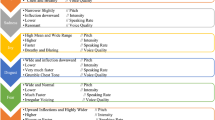Abstract
Numerous examinations are performed related to automatic emotion recognition and speech detection in the Laboratory of Speech Acoustics. This article reviews results achieved for automatic emotion recognition experiments on spontaneous speech databases on the base of the acoustical information only. Different acoustic parameters were compared for the acoustical preprocessing, and Support Vector Machines were used for the classification. In spontaneous speech, before the automatic emotion recognition, speech detection and speech segmentation are needed to segment the audio material into the unit of recognition. At present, phrase was selected as a unit of segmentation. A special method was developed on the base of Hidden Markov Models, which can process the speech detection and automatic phrase segmentation simultaneously. The developed method was tested in a noisy spontaneous telephone speech database. The emotional classification was prepared on the detected and segmented speech.
Access this chapter
Tax calculation will be finalised at checkout
Purchases are for personal use only
Preview
Unable to display preview. Download preview PDF.
Similar content being viewed by others
References
Tóth, S.L., Sztahó, D., Vicsi, K.: Speech Emotion Perception by Human and Machine. In: Proceedings of COST Action 2102 International Conference. Patras, Greece, October 29-31 (2007); Revised Papers in Verbal and Nonverbal Features of Human-Human and Human-Machine Interaction 2008. LNCS, vol. 5042, pp. 213–224. Springer, Heidelberg (2008)
Hozjan, V., Kacic, Z.: A rule-based emotion-dependent feature extraction method for emotion analysis from speech. The Journal of the Acoustical Society of America 119(5), 3109–3120 (2006)
Navas, E., Hernáez, I., Luengo, I.: An Objective and Subjective Study of the Role of Semantics and Prosodic Features in Building Corpora for Emotional TTS. IEEE Transactions on Audio, Speech, and Language Processing 14(4), 1117–1127 (2006)
Klára, V., Dávid, S.: Ügyfél érzelmi állapotának detektálása telefonos ügyfélszolgálati dialógusban. VI. Magyar Számítógépes Nyelvészeti Konferencia, Szeged, pp. 217-225 (2009)
Boersma, P., Weenink, D.: Praat: doing phonetics by computer (Computer program), http://www.praat.org (retrieved)
The Hidden Markov Model Toolkit (HTK), http://htk.eng.cam.ac.uk/
Chang, C.C., Lin, C.-J.: LIBSVM: a library for support vector machines (2001), Software available at http://www.csie.ntu.edu.tw/~cjlin/libsvm
Author information
Authors and Affiliations
Editor information
Editors and Affiliations
Rights and permissions
Copyright information
© 2011 Springer-Verlag Berlin Heidelberg
About this paper
Cite this paper
Sztahó, D., Imre, V., Vicsi, K. (2011). Automatic Classification of Emotions in Spontaneous Speech. In: Esposito, A., Vinciarelli, A., Vicsi, K., Pelachaud, C., Nijholt, A. (eds) Analysis of Verbal and Nonverbal Communication and Enactment. The Processing Issues. Lecture Notes in Computer Science, vol 6800. Springer, Berlin, Heidelberg. https://doi.org/10.1007/978-3-642-25775-9_23
Download citation
DOI: https://doi.org/10.1007/978-3-642-25775-9_23
Publisher Name: Springer, Berlin, Heidelberg
Print ISBN: 978-3-642-25774-2
Online ISBN: 978-3-642-25775-9
eBook Packages: Computer ScienceComputer Science (R0)




